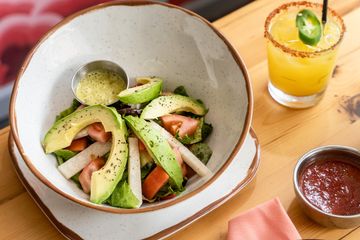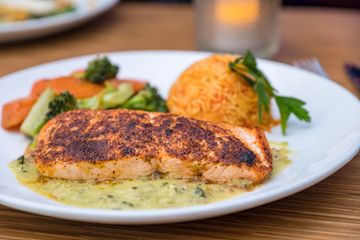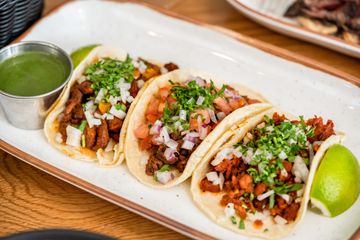Discover the irresistible charm of tacos made daily
Is Mexican Food Healthy And Balanced? Unpacking the Nutritional Perks of Traditional Ingredients
The concern of whether Mexican food is healthy invites an exploration of its typical components. Beans and corn act as fundamental staples, rich in healthy protein and fiber. Avocados supply beneficial fats, while different herbs and flavors add taste and wellness benefits - happy hour. With each other, these elements create a tapestry of nutrition. Nonetheless, the healthfulness of Mexican food typically relies on preparation approaches and section sizes. What role do these aspects play in determining its total dietary value?
The Power of Beans: Protein and Fiber-Rich Staples
Typically forgotten, beans serve as a cornerstone of Mexican food, offering a wealth of nutritional benefits. Rich in protein, they are an exceptional plant-based option for those looking for to satisfy their dietary healthy protein needs. This high protein material supports muscular tissue repair service and development, making beans very useful for both vegetarians and meat-eaters alike. Furthermore, beans are a phenomenal resource of nutritional fiber, which aids in digestion and advertises a sensation of volume, potentially aiding with weight management.
The selection of beans utilized in Mexican dishes, such as black beans, pinto beans, and kidney beans, adds to a diverse taste profile and can improve meals nutritionally. Beans are reduced in fat and include essential vitamins and minerals, including folate, magnesium, and iron. With each other, these characteristics make beans a vital ingredient, supplying both nutrition and nourishment in conventional Mexican price.

Corn: a Versatile Grain With Nutritional Conveniences
Corn sticks out as a versatile grain basic to Mexican cuisine, commemorated not only for its cooking applications however additionally for its outstanding dietary profile. As a main active ingredient in meals like tortillas, tamales, and pozole, corn gives crucial nutrients that add to a balanced diet plan. Rich in carbs, it functions as a significant power source, while additionally being reduced in fat, making it a positive option for numerous nutritional needs.
Corn is a good resource of dietary fiber, which assists in digestion and promotes satiation. It contains substantial amounts of vitamins such as B-complex vitamins, which are important for power metabolic rate. The existence of anti-oxidants, especially carotenoids, adds to total health by lowering oxidative tension. Furthermore, corn is gluten-free, satisfying those with gluten level of sensitivities. In general, the nutritional benefits of corn emphasize its relevance in typical Mexican food and its function in a healthy diet regimen.
Avocados: Healthy Fats and Nutrients in Every Bite
Avocados play a significant duty in Mexican food, matching recipes with their creamy appearance and rich flavor. Beyond their culinary allure, avocados are celebrated for their remarkable nutritional profile. They are a rich source of healthy monounsaturated fats, which can assist reduced poor cholesterol degrees and support heart health. Furthermore, avocados are loaded with vital vitamins and minerals, including potassium, vitamin E, and B vitamins, adding to total wellness.
The high fiber content in avocados aids digestion and advertises satiety, making them an advantageous addition to any kind of dish. Their one-of-a-kind nutrient make-up can additionally support skin health and wellness and supply anti-inflammatory benefits. Including avocados right into traditional Mexican meals or you could try this out enjoying them as a standalone treat can enhance both flavor and nourishment, showing why they are a beloved staple in Mexican food. Generally, avocados supply a delicious means to enjoy healthy fats and important nutrients in every bite.

Flavors and Natural Herbs: Flavorful Health Boosters
While appreciating the rich flavors of Mexican cuisine, one can not forget the vital function that spices and herbs play in enhancing both taste and wellness. Components such as cilantro, chili, and oregano peppers not only add to the lively taste account however likewise give substantial health benefits. Cilantro is recognized for its detoxing residential properties, assisting to get rid of hefty metals from the body, while oregano is loaded with antioxidants and has anti-inflammatory effects.
Chili peppers, a staple in lots of Mexican meals, have capsaicin, which has actually been linked to boosted metabolic process and pain alleviation. Additionally, spices like cumin and coriander assistance digestion and might aid in blood glucose policy. Integrating these delicious health boosters right into dishes not only enhances the cooking experience however likewise advertises overall wellness, making Mexican cuisine not simply scrumptious, however also nutritionally useful.
Typical Cooking Approaches: Enhancing Nutrition and Flavor
Typical food preparation methods in Mexican cuisine play a vital duty in boosting both nutrition and flavor, as they typically prioritize classic strategies and fresh ingredients. Methods such as nixtamalization, where corn is soaked and cooked in an alkaline solution, not just enhance the nutrient account of tortillas however likewise enhance their digestibility - hand crafted margarita. Additionally, making use of slow-moving cooking methods, like stewing or braising, permits flavors to combine magnificently while preserving the honesty of the components

Frequently Asked Concerns
Are Mexican Food Portions Normally Larger Than Other Foods?
Mexican food portions are often larger than those of many other foods. This particular mirrors traditional eating methods, stressing public sharing and hearty dishes, which can result in a much more significant offering size generally.
How Does the Prep Work Method Affect Healthfulness of Mexican Food?
Preparation methods substantially influence the healthfulness of Mexican food. Techniques such as cooking or steaming protect nutrients, while frying can enhance undesirable fat material. Selections of active ingredients and cooking designs eventually establish overall dietary value.
Can Mexican Food Be Tailored for Particular Dietary Limitations?
Mexican food can certainly be tailored for details dietary restrictions. Substitutions, such as using corn tortillas for gluten-free diets or integrating more la loma vegetables, make it possible for individuals to appreciate typical tastes while accommodating various dietary requirements.
What Prevail Misconceptions Concerning Mexican Food and Wellness?
Typical misunderstandings about Mexican food include the belief that it is naturally undesirable, overly zesty, and solely focused on fats. In truth, traditional dishes usually include healthy active ingredients and can be customized to numerous nutritional requirements.
Are There Healthier Options at Mexican Restaurants?
Much healthier choices at Mexican dining establishments usually nino's pizza include barbequed meats, beans, and fresh vegetables. Picking meals that highlight entire components and avoiding hefty sauces can result in a much more healthy dining experience, advertising total well-being.
The range of beans utilized in Mexican recipes, such as black beans, pinto beans, and kidney beans, adds to a varied taste account and can boost meals nutritionally. Avocados play a significant function in Mexican food, enhancing recipes with their velvety appearance and abundant taste. Incorporating avocados into typical Mexican meals or enjoying them as a standalone snack can boost both flavor and nourishment, showing why they are a cherished staple in Mexican food. While delighting in the abundant flavors of Mexican cuisine, one can not neglect the important function that spices and natural herbs play in enhancing both taste and health and wellness. Conventional food preparation approaches in Mexican food play a necessary duty in enhancing both nourishment and taste, as they usually prioritize time-honored strategies and fresh components.